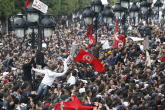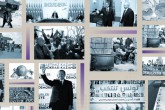One of the contention points that come to mind with the mention of the Middle East is the issue of proxy wars. Proxy wars have been used as one of the technologies of the struggle for survival-sometimes to keep expenditures down, and sometimes to escape accountability. The proxy wars are being carried out, sometimes through the states or insurgents, and sometimes through the sectarian and religious identities. For years, Lebanon has been the most tragic example of proxy wars. Similarly, Afghanistan has been circling around the same vortex for the last ten years. These examples fail to express the weight of what we are trying to say here-in the same way the bloody proxy wars carried out in Iraq over the ethnic-sectarian political tensions fail.
Proxy wars continue in their most bloody and primitive versions in countries such Iraq and Lebanon where war and occupation are being experienced. In addition to these examples, there are also the Cold Proxy Wars that are being carried out through the continuous investments in actors. Cold Proxy Wars refers to actors, leaders, and movements in which investments have been made over the years, and which can be transformed into active combatants in a moment’s notice. In fact, all actors that come into existence, quickly through external factors, outside the political processes, can be considered in this category. In the Middle East, above mentioned leaders or movements who have emerged during or in the wake of coup d’états existed as proxies for years. They have maintained their existence either in the name of a major power, or over the “threat of Israel”, which does not seem to bother Israel at all, or over economic-political equilibrium The wave of uprisings that spread through North Africa, and the Middle East have brought our region to an interesting junction in terms of the proxy wars. We have witnessed the Cold Proxy War actors, who have been the medium for long term political calculations, to gain enough votes to be the second party, not only in post-coup d’état, but also in the post-revolution periods.
This Puritan political stance, that finds its political match in Egypt, has a calculated equal or an antithesis in our region. This political puritanism will continue to found the basis of the problems we will have to face in the short run in the Middle East. It is possible that actors that could not be identified in the proxy wars for “Mubarakism without Mubarak” in Egypt and “Saddamism without the United States” in Iraq will emerge out of the new political puritanism.
These political puritans will provide the unique opportunity to discipline the legal victors of the elections in Egypt; to hold the Saudi administration in a sectarian line; and to keep Israel still hopeful about the Camp David imaginary. As long as the Freedom and Justice Party can prevent this transition period turning into a battle in the first instance, and can prevent ‘benign’ intervention in the long run, it will contribute not only to Egypt’s democratization but also to the stabilization of the region. ![]()



